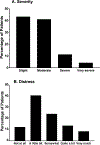Risk Factors Associated With Chemotherapy-Induced Nausea in the Week Before the Next Cycle and Impact of Nausea on Quality of Life Outcomes
- PMID: 29857180
- PMCID: PMC10919143
- DOI: 10.1016/j.jpainsymman.2018.05.019
Risk Factors Associated With Chemotherapy-Induced Nausea in the Week Before the Next Cycle and Impact of Nausea on Quality of Life Outcomes
Abstract
Context: Despite current advances in antiemetic treatments, between 19% and 58% of oncology patients experience chemotherapy-induced nausea (CIN).
Objectives: Aims of this post hoc exploratory analysis were to determine occurrence, severity, and distress of CIN and evaluate for differences in demographic and clinical characteristics, symptom severity, stress; and quality of life (QOL) outcomes between oncology patients who did and did not report CIN in the week before chemotherapy (CTX). Demographic, clinical, symptom, and stress characteristics associated with CIN occurrence were determined.
Methods: Patients (n = 1296) completed questionnaires that provided information on demographic and clinical characteristics, symptom severity, stress, and QOL. Univariate analyses evaluated for differences in demographic and clinical characteristics, symptom severity, stress, and QOL scores between the two patient groups. Multiple logistic regression analysis was used to evaluate for factors associated with nausea group membership.
Results: Of the 1296 patients, 47.5% reported CIN. In the CIN group, 15% rated CIN as severe and 23% reported high distress. Factors associated with CIN included less education; having childcare responsibilities; poorer functional status; higher levels of depression, sleep disturbance, evening fatigue, and intrusive thoughts; as well as receipt of CTX on a 14-day CTX cycle and receipt of an antiemetic regimen that contained serotonin receptor antagonist and steroid. Patients in the CIN group experienced clinically meaningful decrements in QOL.
Conclusion: This study identified new factors (e.g., poorer functional status, stress) associated with CIN occurrence. CIN negatively impacted patients' QOL. Pre-emptive and ongoing interventions may alleviate CIN occurrence in high-risk patients.
Keywords: Nausea; antiemetics; cancer; chemotherapy; quality of life; stress.
Copyright © 2018 American Academy of Hospice and Palliative Medicine. Published by Elsevier Inc. All rights reserved.
Figures
Similar articles
-
Neuropsychological Symptoms and Intrusive Thoughts Are Associated With Worse Trajectories of Chemotherapy-Induced Nausea.J Pain Symptom Manage. 2020 Mar;59(3):668-678. doi: 10.1016/j.jpainsymman.2019.10.023. Epub 2019 Nov 2. J Pain Symptom Manage. 2020. PMID: 31689477 Free PMC article.
-
Nausea still the poor relation in antiemetic therapy? The impact on cancer patients' quality of life and psychological adjustment of nausea, vomiting and appetite loss, individually and concurrently as part of a symptom cluster.Support Care Cancer. 2013 Mar;21(3):735-48. doi: 10.1007/s00520-012-1574-9. Epub 2012 Sep 14. Support Care Cancer. 2013. PMID: 22976921
-
Gastrointestinal symptoms are associated with trajectories of chemotherapy-induced nausea.Support Care Cancer. 2020 May;28(5):2205-2215. doi: 10.1007/s00520-019-05031-5. Epub 2019 Aug 19. Support Care Cancer. 2020. PMID: 31428931 Free PMC article.
-
Metagenomics and chemotherapy-induced nausea: A roadmap for future research.Cancer. 2022 Feb 1;128(3):461-470. doi: 10.1002/cncr.33892. Epub 2021 Oct 13. Cancer. 2022. PMID: 34643945 Free PMC article. Review.
-
Prevention of chemotherapy-induced nausea: the role of neurokinin-1 (NK1) receptor antagonists.Support Care Cancer. 2017 May;25(5):1661-1671. doi: 10.1007/s00520-017-3585-z. Epub 2017 Jan 20. Support Care Cancer. 2017. PMID: 28108820 Free PMC article. Review.
Cited by
-
Co-occurring Gastrointestinal Symptoms Are Associated With Taste Changes in Oncology Patients Receiving Chemotherapy.J Pain Symptom Manage. 2019 Nov;58(5):756-765. doi: 10.1016/j.jpainsymman.2019.07.016. Epub 2019 Jul 23. J Pain Symptom Manage. 2019. PMID: 31349034 Free PMC article.
-
Neuropsychological Symptoms and Intrusive Thoughts Are Associated With Worse Trajectories of Chemotherapy-Induced Nausea.J Pain Symptom Manage. 2020 Mar;59(3):668-678. doi: 10.1016/j.jpainsymman.2019.10.023. Epub 2019 Nov 2. J Pain Symptom Manage. 2020. PMID: 31689477 Free PMC article.
-
The role of disease duration in the use of complementary and integrative medicine for cancer-related fatigue: a cross-sectional study.Support Care Cancer. 2025 Mar 20;33(4):303. doi: 10.1007/s00520-025-09367-z. Support Care Cancer. 2025. PMID: 40111525 Free PMC article.
-
Psychological predictors of chemotherapy-induced nausea in women with breast cancer: Expectancies and perceived susceptibility.Eur J Cancer Care (Engl). 2021 Nov;30(6):e13488. doi: 10.1111/ecc.13488. Epub 2021 Jul 29. Eur J Cancer Care (Engl). 2021. PMID: 34323340 Free PMC article.
-
Alterations in Patterns of Gene Expression and Perturbed Pathways in the Gut-Brain Axis Are Associated With Chemotherapy-Induced Nausea.J Pain Symptom Manage. 2020 Jun;59(6):1248-1259.e5. doi: 10.1016/j.jpainsymman.2019.12.352. Epub 2020 Jan 8. J Pain Symptom Manage. 2020. PMID: 31923555 Free PMC article.
References
-
- National Comprehensive Cancer Network. Antiemetics. 2016. Available from: http://www.nccn.org/professionals/physician_gls/pdf/antiemesis.pdf.
-
- Molassiotis A, Aapro M, Dicato M, et al. Evaluation of risk factors predicting chemotherapy-related nausea and vomiting: results from a European prospective observational study. J Pain Symptom Manage 2014;47:839–848. - PubMed
-
- Hesketh P, Aapro M, Street J, Carides A. Evaluation of risk factors predictive of nausea and vomiting with current standard-of-care antiemetic treatment: analysis of two phase III trials of aprepitant in patients receiving cisplatin-based chemotherapy. Support Care Cancer 2010;18:1171–1177. - PubMed
-
- Grassi L, Berardi MA, Ruffilli F, et al. Role of psychosocial variables on chemotherapy- induced nausea and vomiting and health-related quality of life among cancer patients: a European study. Psychother Psychosom 2015;84:339–347. - PubMed
-
- Pirri C, Katris P, Trotter J, et al. Risk factors at pretreatment predicting treatment-induced nausea and vomiting in Australian cancer patients: a prospective, longitudinal, observational study. Support Care Cancer 2011;19:1549–1563. - PubMed
Publication types
MeSH terms
Substances
Grants and funding
LinkOut - more resources
Full Text Sources
Other Literature Sources
Medical


